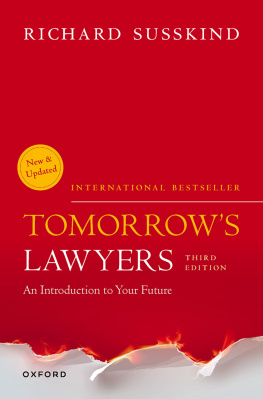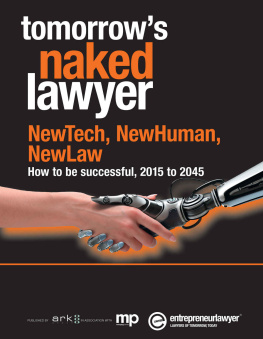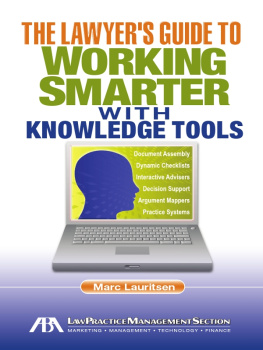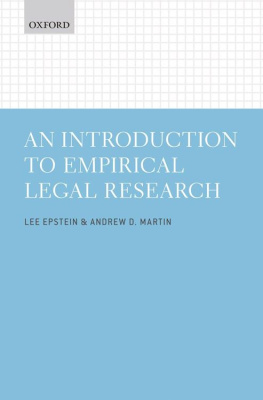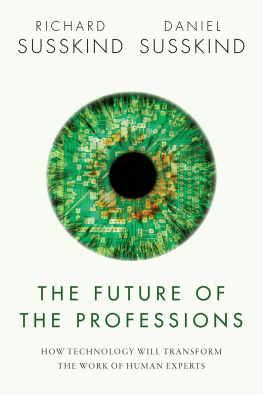Tomorrows Lawyers

Great Clarendon Street, Oxford, OX2 6DP,
United Kingdom
Oxford University Press is a department of the University of Oxford. It furthers the Universitys objective of excellence in research, scholarship, and education by publishing worldwide. Oxford is a registered trade mark of Oxford University Press in the UK and in certain other countries
Richard Susskind 2023
The moral rights of the author have been asserted
First Edition published in 2013
Second Edition published in 2017
Third Edition published in 2023
Impression: 1
All rights reserved. No part of this publication may be reproduced, stored in a retrieval system, or transmitted, in any form or by any means, without the prior permission in writing of Oxford University Press, or as expressly permitted by law, by licence or under terms agreed with the appropriate reprographics rights organization. Enquiries concerning reproduction outside the scope of the above should be sent to the Rights Department, Oxford University Press, at the address above
You must not circulate this work in any other form and you must impose this same condition on any acquirer
Public sector information reproduced under Open Government Licence v3.0
(http://www.nationalarchives.gov.uk/doc/open-government-licence/open-government-licence.htm)
Published in the United States of America by Oxford University Press
198 Madison Avenue, New York, NY 10016, United States of America
British Library Cataloguing in Publication Data
Data available
Library of Congress Control Number is on file at the Library of Congress
ISBN 9780192864727
eISBN 9780192679994
Links to third party websites are provided by Oxford in good faith and for information only. Oxford disclaims any responsibility for the materials contained in any third party website referenced in this work.
I dedicate this book to
Daniel, Jamie, and Ali,
my loving children,
who bring me endless happiness
PREFACE TO THE THIRD EDITION
Rather disconcertingly, I received some congratulatory emails during the pandemic. These messages noted that lawyers had become big users of technology because of COVID, and they insisted in consequence that, Richard, your future has arrived. By implication, they also seemed to be suggesting that it might be time for me to hang up my hat.
I disagree with both propositions.
I do not think that lawyers have arrived at their final destination simply because many now regularly work from home. Mastering video calls and working remotely are but early steps towards the transformed legal landscape that I envisage in my books. Nor do I thinkI am relieved to reportthat my work is done. Indeed, I extend my heartfelt thanks to the many lawyers and law teachers around the world who have encouraged me to prepare this third edition.
Will there ever be a day, though, when tomorrows lawyers will be todays lawyers, and so no further editions will be required? To ask that question is to misunderstand the era in which we now live and labour. Over and above changes that are brought by the horrors of pandemic and war, technology is advancing at such a ferocious rate that, for the foreseeable future, we must expect to be operating in law in a period of endless flux. As our systems become increasingly capable, some current legal jobs will fade, new jobs will doubtless emerge, although many of these, in due course, will also be taken on by machines. From here on in, lawyers will need continually to flex and adapt to keep in demand and remain relevant.
As to the speed of change, that is much trickier to predict. I completed the first edition of this book a decade ago. This means that we are now half-way through the 20-year period, during which, I originally predicted, legal institutions and lawyers would change more than they had in the past two centuries. I never thought that this was such an extreme claim because, in truth, the world of law has not changed much in the last 200 years, or at least, in England, since the reforms of the 1870s. In any event, I see no need to revise my forecast. As discussed throughout the book, looking across the entire legal ecosystem, we have already seen significant changes, and the pace of changeand this is vitalcontinues to accelerate. One modest bit of evidence to support this claim: I had to work much harder to revise the book this time round. A decade on, there were many more changes to note and make than after five years.
That said, the worlds outstanding law firms are still evolving at a sedate pace. I know that many of their leaders say that they have changed their businesses substantially over the last few years. But I believe what we have seen recently in these (massively successful) firms have been some operational shifts at the edges, and some good marketing too, rather than full-scale transformation. However, the early shoots of change are now visible and I anticipate that the 2020s will witness great shifts in the business models underpinning these major firms.
I expect the trajectory of change in law to follow an exponential curve. Over the past decade, we have seen a shallow, steady change and are now seeing signs of more explosive movement. We are at the knee of the curve.
Looking longer term, what would count for me as radical change and transformation in law firms? In answer to that question, let me propose a test, according to which a law firm has radically changed when less than half of its revenue is derived from charging for the time of traditional work of human lawyers. The fundamental revolution in law (and other professions) will come about when we move from one-to-one consultative advisory service to one-to-many online or embedded service. Income will come not from selling peoples time but from licensing content. No law firm in the world currently comes close to passing my proposed test. It may well be that no firms will ever change to this extent. But if they do not, I am confident that other alternative legal providers will instead grasp the opportunityto serve their communities better and, as I say in the body of the text, to make money while they sleep.
Finally, I should say that my own thinking has advanced since 2017, when the second edition of this book first appeared. I have since written a new work, entitled Online Courts and the Future of Justice (2019 and 2021), and, with Daniel Susskind, have published an updated edition of The Future of the Professions (2022). Some of the ideas and findings of these books have found their way into this edition.
Although I try to keep the book short and punchy, I find myself straying further from this aspiration with each edition. No matter its length, though, I stress that this book is introductoryconceived as a brisk canter through the world of tomorrows lawyers. Others are now doing a great job of putting more flesh on the bones. My purpose, as always, is to encourage conversation and then action.
Richard Susskind
August 2022
Radlett, England
PREFACE TO THE SECOND EDITION
One of the central claims in the first edition of this book, published in 2013, was that the legal world would change more in the next 20 years than it has in the past two centuries. Three years on, I believe we are on course. In the intervening period, much has happened in the legal world. To give a flavourmany major law firms have since set up low-cost service centres to undertake routine legal work; the Big 4 accounting firms have rapidly grown their global legal capabilities; there has been a great upsurge of legaltech start-ups, now well over 1,000 worldwide; the idea of artificial intelligence (AI) in law has captured the imagination of innovators across the profession, from market leading firms to law student developers; in England and Wales, in our liberalized legal regime, innumerable alternative business structures have been launched (there are now over 500); professional bodies, such as the Canadian Bar Association, have produced studies on the future of legal services; senior judges have been strongly advocating the wider use of technology; the British government has committed to investing over 1 billion in modernizing and digitizing the court system in England and Wales; innumerable in-house legal departments, especially in the US, have been appointing chief operating officers to rethink and manage their operations; and, if readers will forgive me, more Chinese lawyers have bought this book than English lawyers. In short, much has changed in these three short years. At the same time, most commentators agree that the pace of change is accelerating. And great numbers of leaders across the legal profession are now openly acknowledging that the world of law is entering a period of transformation.

